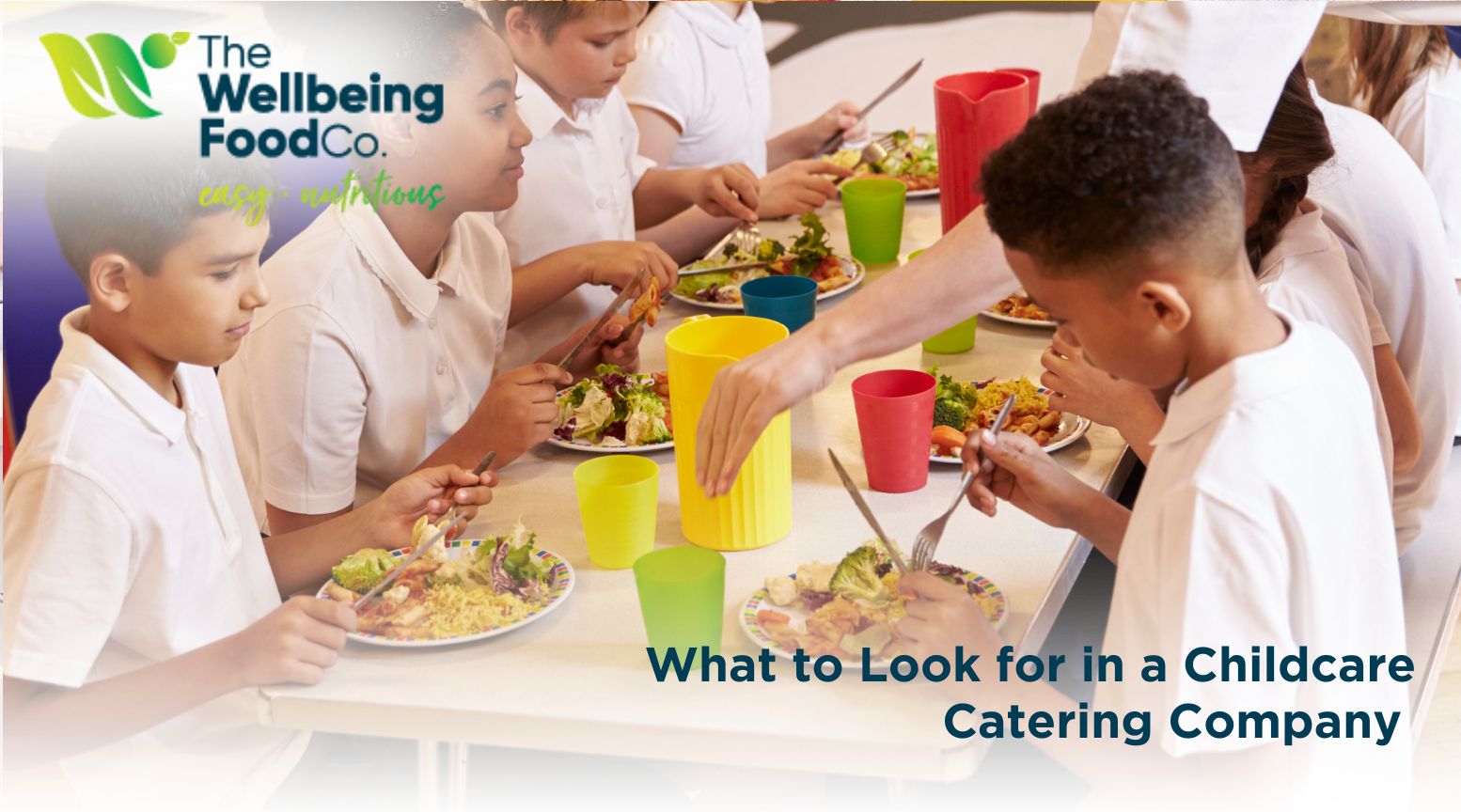Choosing a childcare catering partner isn’t like picking a restaurant or buying snacks off a shelf — it’s a long-term relationship that directly impacts children’s health, development, and daily experience. Parents expect more than full tummies — they want assurance that meals are fresh, nutritious, allergy-safe, and culturally inclusive. For childcare centres, the right childcare catering service means peace of mind, streamlined operations, and support that goes beyond the kitchen.
Whether you’re setting up a new early learning centre or re-evaluating your current food supplier, knowing what to look for is critical. Let’s unpack the non-negotiables, the nice-to-haves, and the red flags to watch out for when choosing a catering provider for your childcare service.
Proven Experience with Early Childhood Nutrition
Not all catering services understand the unique nutritional needs of toddlers. Look for a company that specialises in meals for the early learning sector. This means:
- Menus designed in line with the Australian Dietary Guidelines
- Portion sizes appropriate for children aged 1–5
- Balanced combinations of protein, carbs, healthy fats, and vegetables
- A focus on low-sodium, low-sugar, and low-processed ingredients
Ask if they’ve worked with other centres and whether they can provide references or menu samples that align with best practices in early childhood health.
Fresh, Seasonal, and Locally Sourced Ingredients
Quality starts with what goes into the food. A good childcare catering company should prioritise:
- Seasonal fruit and vegetables
- Free-range or ethically sourced proteins
- Minimal use of preservatives or additives
- Wholegrain options over white flour or refined products
Bonus points if they source ingredients locally — this supports Aussie farmers and ensures the meals are as fresh as possible when they reach your centre.
Flexible Menus That Accommodate All Needs
Every centre is different — and so are the children in your care. Cultural backgrounds, dietary restrictions, allergies, and preferences all come into play. Your catering provider should:
- Offer multiple menu formats (e.g. vegetarian, gluten-free, halal)
- Be able to customise meals for individual children
- Rotate menus regularly to avoid repetition
- Provide documentation for all ingredients and allergens
The goal isn’t just compliance — it’s creating inclusive mealtimes where every child feels catered for.
Transparent Operations and Open Communication
Trust is everything in a childcare environment. Your catering partner should:
- Be upfront about where food is prepared and how it’s handled
- Offer clear protocols for food safety and hygiene
- Maintain communication channels for last-minute changes or updates
- Provide written documentation for menus, deliveries, and food recalls (if needed)
If a provider avoids questions or downplays their systems, that’s a red flag.
Food Safety and Allergy Management
With rising rates of food allergies and sensitivities in young children, safety is non-negotiable. Top-tier catering companies invest in:
- Certified allergen-safe kitchens
- Separate preparation zones for high-risk ingredients
- Staff trained in allergen protocols and anaphylaxis awareness
- Labelling systems to avoid mix-ups at delivery or serving time
Ask how they track dietary requirements and ensure meals don’t get mixed up. One mistake is all it takes — so systems must be bulletproof.
Sustainability and Waste Reduction Practices
Sustainability isn’t just a buzzword — it’s part of responsible early education. Catering companies can contribute by:
- Using compostable or reusable packaging
- Minimising food waste through batch cooking and portion control
- Working with local producers to reduce transport emissions
- Recycling delivery crates or containers
Ask what sustainability measures they’ve built into their model. It’s a good test of how forward-thinking and values-aligned they are.
Delivery Logistics and Timeliness
Food might be perfect on paper, but if it arrives late, cold, or mixed up, it’s a problem. Reliable catering partners:
- Deliver within set windows consistently
- Use insulated containers to maintain food temperature
- Have a clear system for labelling and sorting meals by room/child
- Offer support in case of delays or misdeliveries
Smooth logistics keep educators focused on kids — not chasing lunch boxes or deciphering unmarked containers.
Centre and Educator Support
A good catering company isn’t just a drop-off service — they’re a partner to your centre. That might include:
- Training educators on portion sizes and safe serving practices
- Providing nutritional education resources for staff or families
- Offering parent info sheets or online access to weekly menus
- Visiting the centre to answer questions or handle feedback
Support means your team feels empowered, informed, and connected to the food program — not left in the dark.
Frequently Asked Questions
1) What’s the difference between a childcare catering company and a general food delivery service?
A childcare catering company is specifically tailored to the early learning environment. They understand the developmental needs of toddlers, food safety in group settings, allergy risks, and the logistics of large-scale meal preparation. General delivery services may not offer the same level of care or compliance. Childcare caterers work within industry frameworks like the National Quality Standard (NQS) and align with dietary guidelines. They also build menus around things like texture progression, choking hazard prevention, and portion sizes for 1–5-year-olds. This makes a huge difference in outcomes, behaviour, and trust from families.
2) How often should a catering company update their menu?
Seasonal updates are ideal — at least once per term. Rotating menus keeps things interesting for kids and ensures that meals are built around fresh, in-season ingredients. Frequent changes also help centres respond to feedback, introduce new flavours, and avoid meal fatigue (common when kids see the same lunch every Tuesday for months). A good provider will consult with the centre, use child feedback to refine dishes, and ensure menus reflect cultural diversity and dietary preferences. Variety is key — especially during the crucial years when food acceptance is still developing.
3) What should I ask before signing on with a catering company?
Key questions include:
- Do you follow the Australian Dietary Guidelines?
- How do you handle allergies and intolerances?
- Where is the food prepared, and is the kitchen certified?
- Can I see a sample menu and ingredient list?
- How are meals labelled and delivered?
- What happens if there’s a delivery issue?
- Do you provide communication tools for parents?
These questions help assess not just the quality of food, but the strength of systems behind it. A confident provider will answer clearly and proactively offer documentation or case studies.
4) Is it cheaper to cook meals in-house rather than outsource?
On paper, it might seem cheaper — but once you factor in staffing, training, equipment, compliance, and ongoing ingredient costs, outsourcing often wins. A professional childcare catering company brings scale, efficiency, and specialised knowledge. They also reduce risk: no need to worry about cross-contamination, food handling training, or health department audits. Plus, outsourcing frees up your team to focus on education — not grocery runs or kitchen cleanup. For many centres, the cost is comparable or even less once everything is considered.
5) How do I know if a catering provider is a good fit for my centre?
It comes down to values, transparency, and responsiveness. A good fit feels collaborative. The provider should welcome questions, offer tailored options, and be willing to adjust based on feedback. Communication should be easy — you shouldn’t have to chase them for updates. Ask other centres for references, request a trial period or tasting session, and involve educators in the selection process. When the partnership works, you’ll notice fewer parent complaints, happier staff, and kids who actually eat what’s on their plate.
Build Confidence with Every Meal
The right catering partner can transform how your centre delivers care — taking the stress out of meal planning and putting nutrition back where it belongs: at the heart of early learning.
To learn more, please call us at the Wellbeing Food Co today on (07) 3062 9268 or leave a message.



Comments are closed